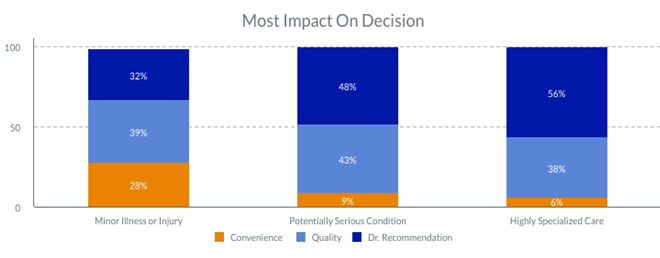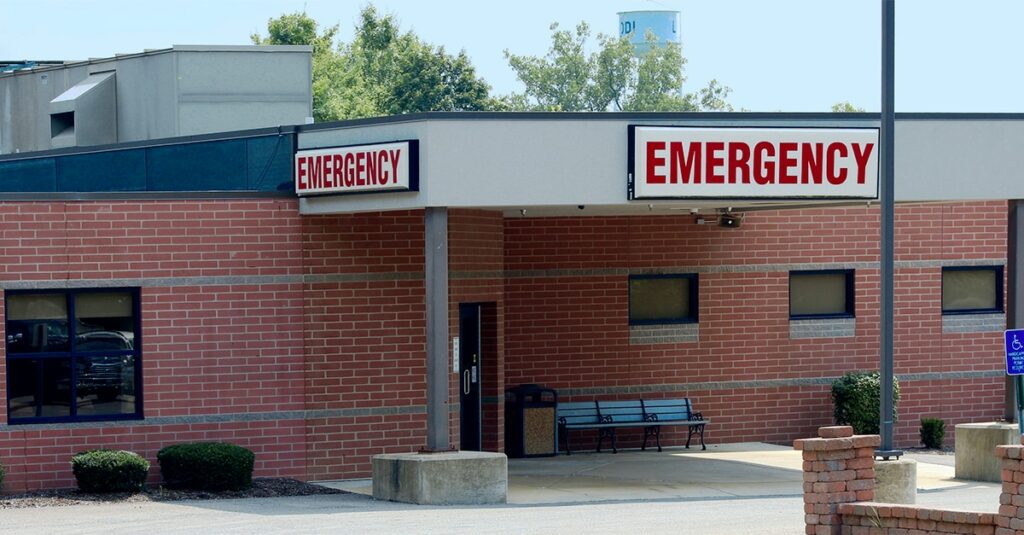Healthcare institutions are extremely important in rural and suburban communities. They’re often the primary (sometimes only) option for residents to receive care, and they serve as a major employer for the community. However, many rural and suburban hospitals, especially those within a reasonable driving distance to a larger, urban community, are battling the issue of outmigration. Patients bypassing their local hospital, even when the services needed are offered locally, can lead to lower patient volumes and revenue, putting some hospitals at risk of closure.
Why are patients leaving their community? The reasons can typically be boiled down to at least one of three factors:
- Quality of care received during a recent visit, often in the emergency room
- Lingering perceptions of the brand that the hospital has not been able to shed
- Local physicians referring to specialists who practice at other hospitals
Even if a consumer prefers another institution, chances are most have had an experience with their local hospital either directly as a patient or as a visitor. The emergency room often serves as a patient’s first impression of a hospital, so it is important for this impression to be excellent to help shape the perception of the quality they can expect in other areas as well.
PRC’s philosophy has long been that it is not enough to just provide good care, you must provide excellent care. Our data has shown that patients who feel their experience was “excellent” are four times more likely to recommend that hospital than those that say “very good.” Hospitals who have successfully been able to create a culture of excellence have a better chance of retaining patients. Patient Experience surveys like what PRC provides for many hospitals help hospitals understand those perceptions.
Our National Consumer Study found that while convenience has the biggest impact on decisions of where to go for minor illnesses or injuries, quality and physician recommendations have bigger impacts on decisions of where to go for highly specialized care.

PRC’s Consumer & Brand research studies observe which hospital consumers in the market prefer and why. When looking at the deeper “why,” we categorize the responses by those based on convenience vs. quality. Healthcare institutions who are preferred mainly for reasons related to convenience are at risk of outmigration for serious care, and vulnerable to losing patients to another healthcare institution potentially entering their market.
For example, there are communities where less than 25% of respondents who prefer the local community hospital do so for reasons related to quality. In these cases, convenience is the driving force for them, and these hospitals often suffer from outmigration for serious care. In other communities, we find hospitals that range from 25–40% who prefer them for reasons related to quality. These hospitals have been able to start shedding the image of being just a convenient option, rendering outmigration less of an issue. In a select few rural and suburban communities, the percentage of consumers who prefer them for reasons based on quality exceeds 40%. These are hospitals that have done an outstanding job of establishing a strong, well-built brand with positive consumer perceptions that will keep patients local, only sending patients outside the community for specialties they do not provide.
So, what if your data suggests that you do provide high quality care in the eyes of your patients, but you are still losing patients to outmigration? It may come down to branding. Branding is not what you tell consumers you are, rather it is what consumers believe you to be. You cannot simply inform consumers that you have the services that they need. Often, consumers have a bigger-is-better mentality, perceiving hospitals in larger communities to have more services, newer technology, better doctors, and better overall care. Rural hospitals must figure out how to brand themselves in a way that will change that mindset in consumers in their market.
Additionally, physician relationships and referrals can cause a disconnect between perceptions of quality and where patients ultimately go for care. Regardless of preferences patients may have of where to receive care, many will follow the guidance of their referring physician. Local physicians, whether private or affiliated with the local hospital, need to have confidence in all aspects of the care their patients will receive. Having strong relationships with those physicians is extremely important; therefore, PRC has made it a priority to help hospitals with Physician Partnership Solutions such as referring physician experience studies and market needs assessments. Rural and suburban hospitals need to understand what influences physicians to refer to one institution over another and solidify their relationships to ensure they are keeping patients local when the services needed are available.
If outmigration is a concern in your community, Consumer & Brand research is a good place to start to explore your specific situation. Is there opportunity to improve the quality of care provided to patients? Is there a disconnect between how patients and consumers feel? Are you considered a convenient option or quality option among those who prefer you? Does your brand messaging resonate with consumers in your specific market? Do consumers currently migrate to larger cities for other reasons such as shopping or work? What is most important in driving healthcare decisions in your market? Where are there opportunities to inform and begin to shape perceptions? PRC will listen to what your goals and objectives are and tailor a survey to fit your needs so that you can gain insight that will help drive strategies to help combat outmigration.
Contact us today to explore the opportunities of conducting Consumer & Brand research for your organization.


